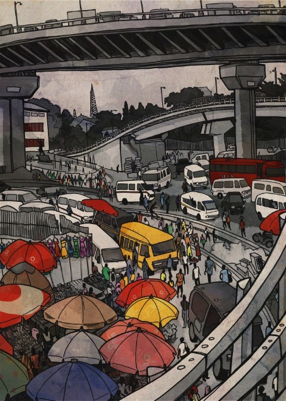GLI supports the organisation, representation and livelihoods of workers in the informal passenger transport economy through research and education programmes, working in partnership with the International Transportworkers Federation (ITF) and various other organisations.
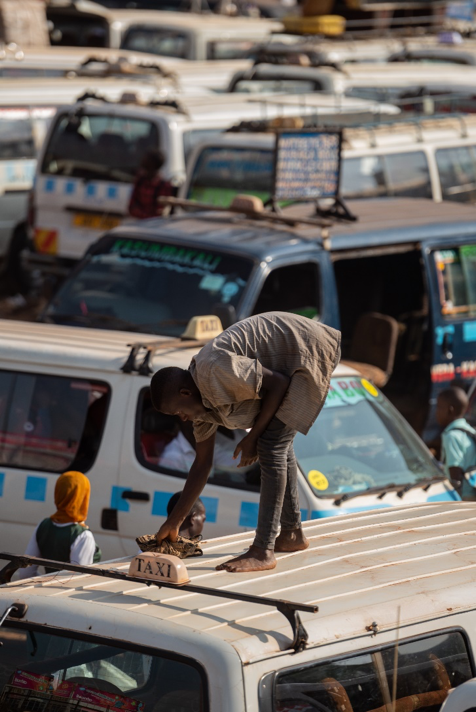 After initial baseline research on livelihoods in the informal transport economy, GLI’s Informal Transport Programme was launched in 2013 with the coordination of a three-year education project with the ITF to support the capacity of trade unions to engage with informal workers in Africa, Asia and Latin America. This was led by ‘mentor unions’ in Uganda, Niger, Philippines, Nepal and Colombia, each working in partnership with unions in their respective regions. The project produced a range of education multi-lingual materials and videos used in national and regional training events to discuss union policy, strategies and practical organising methods, and led to the adoption of the Informal Transport Workers’ Charter at the ITF’s World Congress in 2018.
After initial baseline research on livelihoods in the informal transport economy, GLI’s Informal Transport Programme was launched in 2013 with the coordination of a three-year education project with the ITF to support the capacity of trade unions to engage with informal workers in Africa, Asia and Latin America. This was led by ‘mentor unions’ in Uganda, Niger, Philippines, Nepal and Colombia, each working in partnership with unions in their respective regions. The project produced a range of education multi-lingual materials and videos used in national and regional training events to discuss union policy, strategies and practical organising methods, and led to the adoption of the Informal Transport Workers’ Charter at the ITF’s World Congress in 2018.
This has been followed by national projects with unions and workers’ associations in Africa, focused on the potential impact of Bus Rapid Transit (BRT) systems in major cities, detailed economic and social analyses of informal urban passenger transport industries, and practical steps towards the formalisation of informal passenger transport based on the inclusion of democratic workers’ organisations in policy development, planning and implementation.
The programme also includes partnerships with the International Labour Organisation, Friedrich Ebert Stiftung and other agencies in capacity development for unions to effectively organise, represent and form alliances with informal transport workers, and to develop strategic policy on the application of ILO standards and recommendations in the formalisation of informal work in the transport industry.
In all activities, GLI is committed to a participatory approach, working with workers’ representatives in all aspects of research and education, supported by local qualified and experienced research specialists in transport and/or the informal economy. Our field research is undertaken by local teams with first-hand knowledge and experience of the industry, ensuring the trust and support of the workers concerned and relevance of the research to their needs.
GLI currently supports the International Transport Workers’ Federation’s (ITF) Our Public Transport campaign, concentrating on work with ITF affiliated unions in Africa representing informal workers, and assessing the impact of “Bus Rapid Transit” in African cities
GLI previously coordinated the Informal Transport Workers Project on behalf of the International Transport Workers Federation (ITF), launched in October 2013, co-financed by the ITF, FNV (Netherlands) and the ILO.
Click here to read and download our Informal Transport Programme Brochure.
Major projects
2023 –
Abidjan Bus Rapid Transit and Metro: Labour Impact Assessment 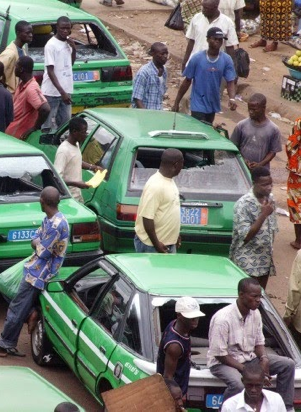
An assessment of the potential impact of the World Bank-financed Urban Mobility Project, including the introduction of Bus Rapid Transit (BRT) on the workforce of Dakar’s gbaka and woro-woro informal transport industry and a contribution towards the active engagement of transport workers’ representatives in shaping a modern, accessible, efficient and environmentally sustainable transport system for the city.
The project was commissioned by the ITF.
Click here to read this report in English.
Click here to read this report in French.
2021 –
INFORMAL TRANSPORT WORKERS IN ACCRA: Livelihoods, Organisation and Issues
A description of the informal transport workforce in Accra, including those working in the trotro minibus, taxi and okada (motorcycle taxi) industries. It examines workforce characteristics, livelihoods and employment relationships, provides in-depth economic profiles of operations, identifies key issues, and considers options for formalisation.
The report is based on research undertaken by GLI in 2021 in partnership with the University of Cape Coast and transport trade unions in Ghana, as part of a broader project with Transitec Consulting Engineers and Organisation Development Africa (ODA), commissioned by the Ghana Urban Mobility and Accessibility Project (GUMAP) of the Ministry of Local Government and Rural Development.
Click here to read this report.
2020 –
Informal Passenger Transport Beyond COVID-19: A Trade Union Guide to Worker-Led Formalisation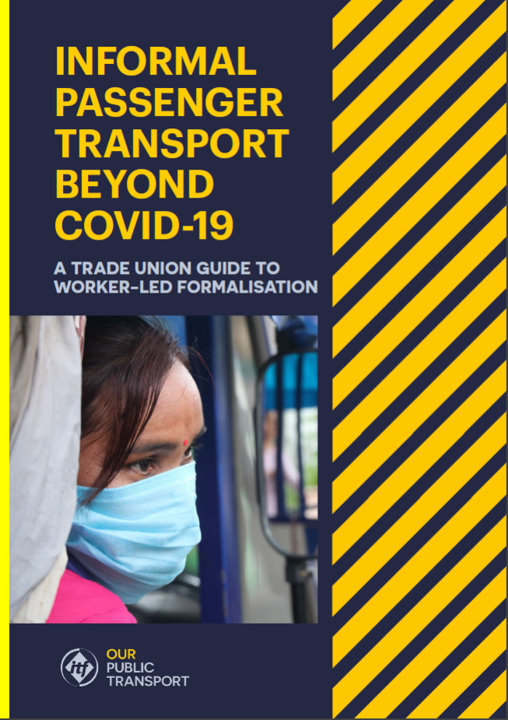
A guide for trade unions and associations of informal transport workers on the impact of the pandemic on informal passenger transport workers, the response of transport authorities and the urgent need for reform towards inclusive formalisation.
The guide was commissioned by the ITF.
Click here to read this guide.
2019-2020
Kampala Bus Rapid Transit: Understanding Kampala’s Paratransit Market Structure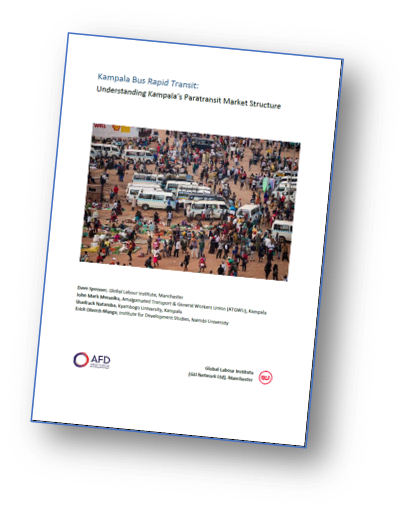
A detailed assessment of the market structure and workers’ livelihoods in the informal transport industry in Kampala, including minibus (“taxi”) and motorcycle taxi (“boda-boda”) services. It contributes towards an understanding of how transport services can be incrementally improved and professionalised to minimize some of its negative effects on Kampala overall transport system, maximise opportunities for decent employment and integrate existing informal services in plans for new transport regulation and infrastructure, such as BRT.
The project was commissioned by Agence Française de Développement (AFD) to support the Government of Uganda and the Kampala Capital City Authority in preparation of the planned introduction of BRT.
Click here to read this report.
2019 –
Dakar Bus Rapid Transit: Labour Impact Assessment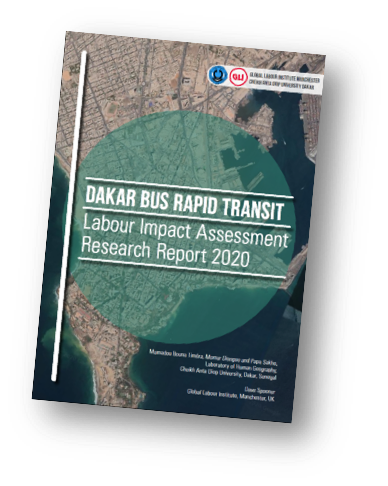
An assessment of the potential impact of the introduction of Bus Rapid Transit (BRT) on the workforce of Dakar’s informal transport industry and a contribution towards the active engagement of transport workers’ representatives in shaping a modern, accessible, efficient and environmentally sustainable transport system for the city.
The project was commissioned by the ITF and undertaken in partnership with the Laboratoire de Géographie Humaine at the University of Dakar (UCAD), and Women in Informal Employment: Globalizing & Organizing (WIEGO).
Click here to read this report in English.
Click here to read this report in French.
2019 –
Bus Rapid Transit and the Formalisation of Informal Public Transport
Policy options for trade unions and workers’ associations to consider when planning consultation and negotiation with city governments and transport planning and regulation authorities on the introduction of BRT. It explores the major issues raised by BRT projects as well as the opportunities for a just transition to sustainable and efficient public transport services.
The research and publication was commissioned by the ITF and drew extensively from the contributions of participants in regional ITF workshops on BRT and Inclusive Planning for Sustainable Transport.
Click here to read this report in English.
Click here to read this report in French.
Click here to read this report in Spanish.
2017-19
Nairobi Bus Rapid Transit: Labour Impact Assessment 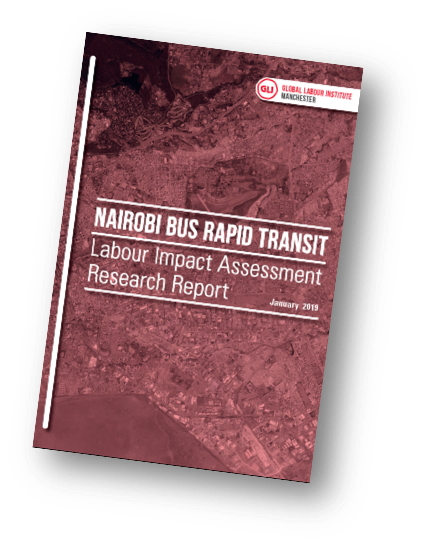
An assessment of workers’ livelihoods in the matatu industry, the potential impact and implications of BRT for them in Nairobi, and examples of good practice in the inclusion of workers’ organisations in the development of BRT policy and implementation by local, national and international decision-makers elsewhere in sub-Saharan Africa.
The project was commissioned by the ITF, and was delivered in partnership with local trade unions, with the support of the Institute for Development Studies at the University of Nairobi, the Kenya Transport Research Network, and the Friedrich Ebert Stiftung.
Click here to read this report.
2016-17
Transforming Transport Unions through the Mass Organisation of Informal Workers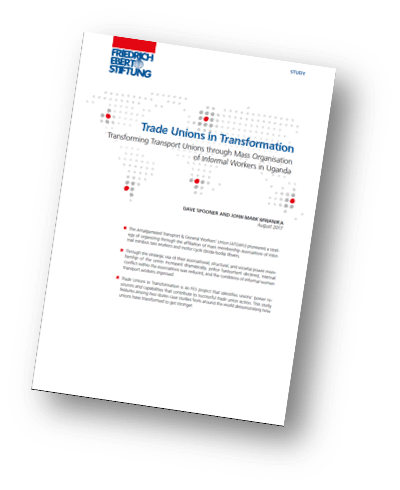
A Case Study of the Amalgamated Transport & General Workers Union (ATGWU) in Uganda which pioneered the successful organisation of more than 100,000 informal transport workers through the formation of alliances with informal workers’ associations.
The project was commissioned by the Friedrich Ebert Stiftung as a contribution to its Trade Unions in Transformation project and undertaken by GLI in partnership with ATGWU.
Click here to read this case study.
2013-16
ITF Informal Transport Workers’ Project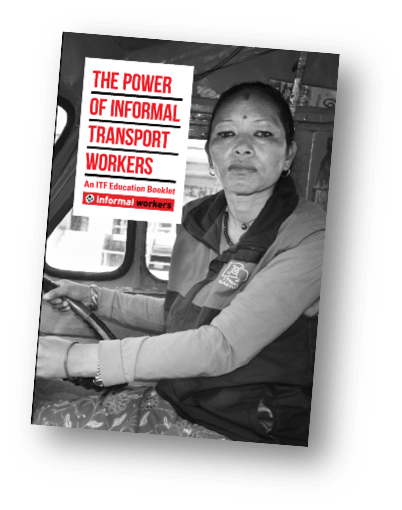
Design and management of research and education in Africa, Asia and Latin America to support the democratic organisation and representation of informal transport workers.
The project included regional policy seminars and training workshops and direct support to unions in their regions in developing skills and policies to build informal workers’ organisation including design and delivery of training for unions and associations of paratransit workers in Niger, Uganda, Nepal, Philippines and Colombia.. The mentor unions developed new organising methods – mapping informal transport hubs, building alliances with informal associations, researching employment relationships, and supporting collective bargaining with employers, governments and transport authorities.
The project was a partnership with ITF and FNV Mondiaal, the international development organisation of the Dutch FNV trade union confederation.
Click here to read this booklet.
2010-2013
Baseline research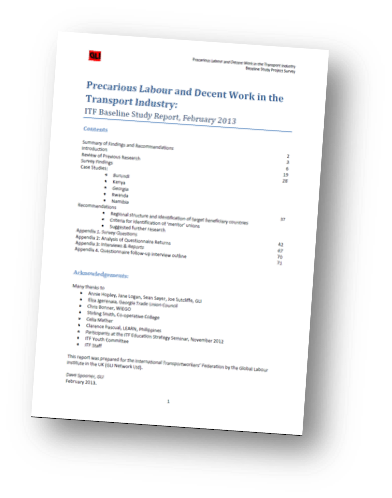
The ITF Baseline Survey Report on Precarious Labour and Decent Work in the Transport Industry provided a baseline and guided the design of the 2013-16 ITF Informal Transport Workers’ Project.
This report brings together findings from 51 unions in 38 countries.
Its goal was to improve knowledge of the extent, nature and trends in precarious and informal employment in the major transport sectors, and to identify the experience of union organisation, representation and collective bargaining among precarious and informal workers.
This research and publication was comissioned by the International Transportworkers’ Federation.
2011
Transport Workers in the Urban Informal Economy: Livelihood Profile
Research and literature review to summarise available data and analysis on the livelihoods, organisation and issues faced by informal transport workers.
The research was commissioned by the Bill & Melinda Gates Foundation, in partnership with WIEGO.
Click here to read the Informal Transport Livelihood Profile.

